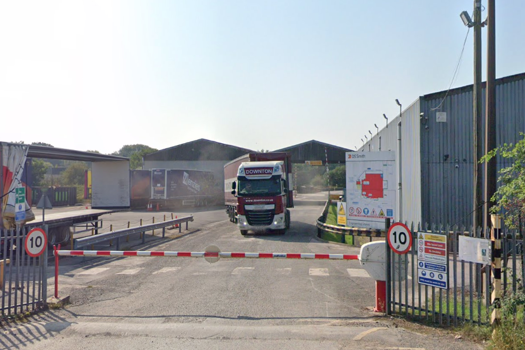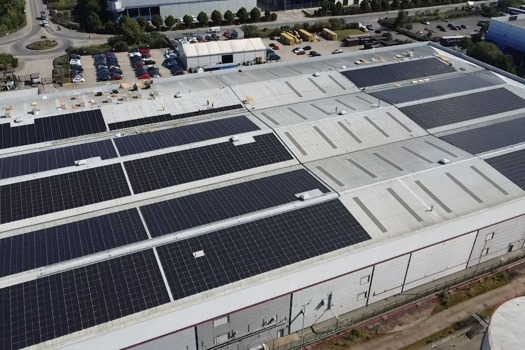Does that rule out BCS as a candidate for our Best of British series?
No, because Kolbus Autobox designs, manufactures and employs in the UK, and it is owned by Kolbus UK Ltd. This year it has already introduced two new machines, with plans for more soon.
“Kolbus Autobox is a limited company in its own right,” says Greg Bird, a long-standing Kolbus veteran who is now managing director of both Kolbus UK and Kolbus Autobox. “We do all our manufacturing in the UK and make or locally source a lot of our components. We’re as British as you can get, to be honest!”
The company makes a range of corrugated boxmakers and optional modules, aimed at end-user manufacturers and suppliers that want to make their own corrugated transit packaging, or outers, to hold finished goods for transport and delivery, rather than buying them in from outside converters.
Made to measure
Bird says that this style of end-user made-to-measure boxmaking fits in well with current trends for both e-commerce and waste reduction. “If you buy in standard sized boxes and have to fill up unused space with bubble wrap or other fillers, you’re paying to ship fresh air,” he says. “Made-to-measure boxes can be smaller, with lower material costs and weight. Oversized boxes waste space, so you get fewer in a container or truck.” On-demand production helps too, as there’s less need for storage space.
The Covid crisis of the past two years has been both a challenge and an opportunity, Bird says. “Covid meant that people have been putting off projects to see what would happen. Now there’s Ukraine and people again want to see how it pans out. Plus there are higher energy and material costs.
“But we’ve also seen the growth in e-commerce, where people want more transit packaging. Our compact machines can fit in a corner of a factory that makes other things. Buying from us means there’s a new machinery cost, but there’s a pretty fast payback.”
The origins of Autobox
The company was originally set up as Autobox Machinery in 1979 by Peter Thomson, an engineer, salesman and entrepreneur. He designed a short-run boxmaking machine. Thomson ran it until 2008, when it was bought by Barry Tabor, a director of the company. He set about re-engineering the boxmaker with much stronger and more accurate side frames to replace the original fabricated construction, making it modular with optional flexo and multi-cut units.
In 2012, Autobox acquired a nearby boxmaking machinery specialist, Andrew & Suter in St Albans. This was originally set up in 1898 to import machinery from Crathern & Smith in the US, expanding its range into other imports over the next century. A&S was run by the Suter family throughout, until the final managing director Mark Suter sold the company to Autobox in 2012.
It moved into Autobox’s big factory and office unit at Houghton Regis, near Dunstable, which has about 2,000sqm of floor space on several levels thanks to mezzanine floors. In the 2000s A&S started manufacturing its own small-format multi-point gluing machines, the Nova, Multi-Nova and Super-Nova. Kolbus Autobox still makes the Multi-Nova MN400, for sheet sizes up to 1,700x1,000mm.
With new capabilities and products, a change of name was appropriate, so the holding company was called British Converting Solutions. When Kolbus bought BCS it revived the Autobox name. Tabor stayed with the company until 2020.
Why Kolbus bought BCS
The purchase of BCS reflected the major changes Kolbus was going through. Based in Rahden in north-west Germany, it was best known as a long-established manufacturer of top quality, high-volume and increasingly variable-sized book binding machinery, particularly block assembly and gluing systems. However in January 2018 it transferred its binding lines to Muller Martini.
This left it with an established range of automated hardback book casemaking machines, plus a new line introduced at Drupa 2012 that adapted the same machinery to make luxury packaging boxes from rigid board with paper or cloth coverings. This established Kolbus’ interest in short-run packaging, although Autobox works with corrugated and not the rigid board of luxury packaging.
Kolbus’ other interest is in flexo presses with inline die-cutters from the US firm Hycorr that it bought in 2012. Bird says that May will see the European introduction of the press-cutters for the first time, under the Kolbus name.
There’s plenty of space at the site, so when Kolbus UK’s lease came up for renewal in Milton Keynes in 2019, it made sense to transfer that to Houghton Regis as well – the site is now called Kolbus House.
It has offices, parts store, seven CNC machine tooling lines (including a plasma cutter), assembly, pre-delivery testing and despatch. Some components are made by local suppliers, and some are made by Kolbus in Germany.
Bird says that Kolbus Autobox usually makes “four to five systems per month. They involve different numbers of modules, so nothing is typical”.
Building up skills
Currently Kolbus Autobox employs about 24 people. Beside Bird, there are two other directors: Simon Penwright as operations director and Jon Walker as technical director. Robert Flather is chairman of both Kolbus UK and Kolbus Autobox. He’s stepped back somewhat lately as he is currently Master of the Worshipful Company of Stationers but will return when his year is up in July.
Penwright started as a sales engineer at Andrew & Suter in 1997 and progressed through being general manager to becoming a director in 2011, staying through the takeovers by Autobox and Kolbus. Walker joined Kolbus from Timsons at the end of 2014.
“We do our own R&D here in Houghton Regis,” says Bird. We have six people involved, headed by Jon Walker.” Since the Kolbus acquisition, the company has switched from Solidworks 3D CAD design software to Siemens NX for commonality with the German offices.
There are currently two apprentices, with plans to take on four more this year. Penwright is proud of this programme. “Our factory is made up of 50% skilled former apprentices in their mid to late 20s,” he says. “There’s a big skills shortage in this area and we’ve had a lot of success in training people. We are passionate about training.”
Bird says that Kolbus Autobox turns over about £6m. Sales are currently split equally between domestic and export markets, although in “normal times” it is more like 60% exports. Joining the Kolbus group has opened up international prospects considerably, he says. “We sell through the Kolbus network alongside casemakers and luxury packaging machines. This gives us a lot more technicians worldwide than before and we’re seeing a big uptake in service revenues as a result.”
Product range
Kolbus Autobox’s product range centres on its biggest seller, the Autobox AB300, handling corrugated board up to 2.6m wide with unlimited lengths, trimming to size and then cutting slots and forming creases at speeds up to 100m/minute. Setup for a new style takes about a minute using the touchscreen. It can handle about 50 FEFCO styles from standard boxes to wraps and pallet boxes. Options include automation, inline printing and gluing.
Adding the MC300 multi-cut unit doubles the number of FEFCO styles that can be handled, with extra creases and the facility for cutouts for handles and windows.
Bird says that the AB300/MC300 combination produces the widest range of box sizes and patterns. However if you don’t need all that, this year saw the introduction of the compact, lower cost AB310, incorporating multi-cutting in a single unit, to handle about 80% of the styles.
The even more compact Boxer BX200 is an easy to use, lower cost model that can produce 100 styles on sheets up to 1,950mm wide, at up to 80m/min. This was the subject of a Printweek Me & My at customer SMP in July 2018.
For more limited quantities there’s a three-unit manually fed offering, comprising the Slitter-Scorer SC100; the programmable Box-Maker BM100 for slitting and creasing; and Pro-Melt PM100, a simple hot-melt gluer.
The range is rounded off with the Pro-Gluer PG100, a simple straight-line gluer, and the Multi-Nova MN400 for complex gluing patterns.
There are currently two single-colour digital print modules on offer. The small, low-cost Digi-Lite DL300 is a free-standing unit that can be wheeled to the back of a box-maker, to add text, codes and logos up to 70mm wide with UV-cure ink. It runs at up to 30m/min.
The more capable DP300 is a ground-up development from Kolbus also introduced this year. It’s currently made in Germany, but production will switch to Houghton Regis. It’s 560mm wide with a choice of print heads offering resolutions up to 360dpi with “quick cure” ink. It runs at up to 100m/min.
What’s next?
“There are always things in the pipeline, for instance we’re hoping to have automatic waste removal from slots,” says Bird. “For the next Drupa we are hoping to have designed a whole new system, the next-generation AB300 and AC300.”
STAR PRODUCT
“The biggest seller by far is the flagship AB300 and MC300 combination,” says Bird. “This is a pretty indestructible workhorse that handles any type of box. There are lots of modules that can be added retrospectively, so it’s a very flexible investment.”










